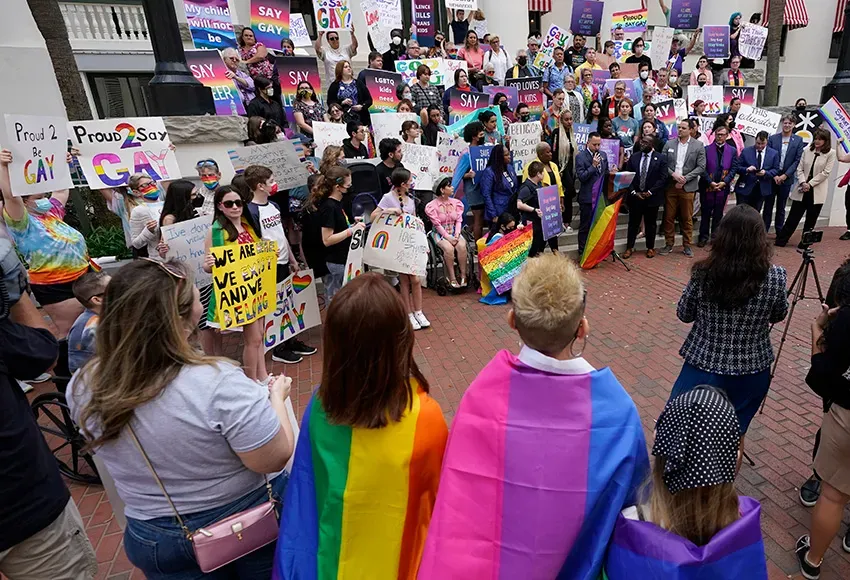The rise in transphobia across the United States has many members of the community concerned for the safety of Trans and gender-nonconforming people. Last month, far-right commentator Michael Knowles announced at the Conservative Political Action Conference (CPAC) that "transgenderism must be eradicated from public life entirely." Though he claims that "transgenderism" and Trans people are separate, many saw his use of "eradicate" as a genocidal call.
Fears that the Trans community is being increasingly dehumanized have been rising recently, particularly after a Florida legislative committee hearing on a Transgender-related restroom bill. During that hearing, Republican Rep. Webster Barnaby called Trans people "demons," "imps," and "mutants."
Transphobic hysteria has also been spreading the idea that Trans people are dangerous and violent. This contrasts starkly with the findings of a study by the Williams Institute at UCLA School of Law that found that Transgender people are more than four times more likely than cisgender people to be the victims of violence.
The Florida legislature passed House Bill 1297 on April 13, and it will likely be signed into law by Gov. Ron DeSantis once it reaches his desk. This will expand the death penalty to anyone who "commits sexual battery upon, or in an attempt to commit sexual battery, injures the sexual organs of a person less than 12 years of age."
At first glance, this bill seems appealing to those who want harsher penalties for child abusers. However, some are raising the alarm that if Florida's definition of sexual battery were to be expanded, it would have devastating consequences. The question is: will Florida define gender-affirming care for minors as sexual battery?
This is not a far-fetched idea; Texas has House Bill 42 in committee, which would define certain "acts by a medical professional or mental health professional for the purpose of attempting to change or affirm a child's perception of the child's sex, if that perception is inconsistent with the child's biological sex," as child abuse, including puberty blockers.
To say that Florida could take a similar approach is not a stretch of the imagination, and in that case, the lives of parents and doctors seeking to treat Trans youth in the state could be put in jeopardy.
It can happen here
Florida's HB 1297 also changes the requirement of a unanimous jury vote for a capital offense to eight out of twelve voting in favor. This will likely go to the Supreme Court, where its constitutionality will be debated. In 2008, the Supreme Court decided in the case of Kennedy v. Louisiana that the death penalty should only be applied to crimes in which the victim died or else it violates the Eighth Amendment's Cruel and Unusual Punishments Clause. It cannot be said for sure what our current Supreme Court might decide.
But it is no longer an option to argue that "it can't happen here" given that Florida has proved how far it is willing to go to hurt the LGBTQIA+ community. For example, Senate Bill 254 says that the state can take emergency custody if a child or a sibling or a parent is "at risk of, or is being subjected to the provision of sex-reassignment prescriptions or procedures." If made law, this would separate Trans youths from their families and would legalize cisgendered children to be taken from their Trans parents.
Considering that Florida legislators are willing to state that the "risk" of exposure to gender-affirming care is child abuse, they are only a few steps away from redefining what constitutes sexual battery to a minor.
It is clear that, when one examines the potential effects of these bills combined, along with the possible laws they could propose next, Florida is not a safe place for Trans people. State legislators are treating Trans identities as a "social contagion"; under the guise of "wanting to protect children," they intend to punish doctors and parents for trying to provide potentially life-saving care to Trans youths.
House Bill 1297 can do a lot of harm, especially if the Supreme Court finds in favor of it. The fear that this expansion of the death penalty could extend to Trans people is not unreasonable. Consider the many pieces of anti-LGBTQIA+ legislation in Florida and the growing slander of calling Trans people "child groomers." When lawmakers, politicians, and far-right commentators say they want to "eradicate transgenderism from public life" verbally or through passing anti-Trans bills, we should believe them.


